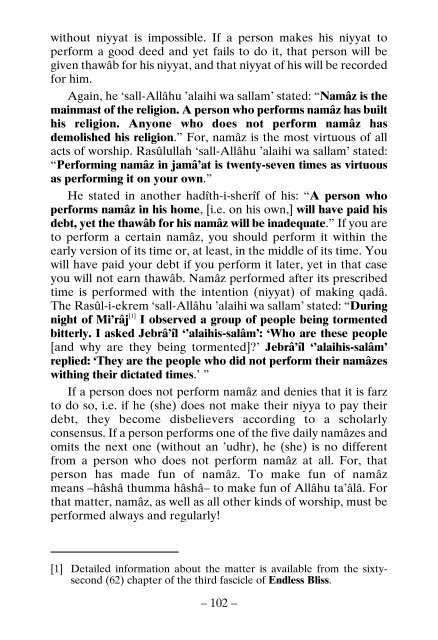O Son !
THE BOOK ‘O SON’ Al-hamdu lillâhi Rabbil ’âlamîn. Wa-s-salâtu wa-s-salâmu ’alâ Rasûlinâ Muhammadin wa Âlihi wa Sahbihi ajma’în. 1– O son! Collecting from books written by the scholars of the Hanafî Madhhab three hundred and sixty hadîth-i-sherîfs and forty-four khabars and also the seven essentials and the five rukns and the seven wâjibs and the fourteen sunnats and the twenty-five mustahabs and the fourteen mufsids of namâz, I have explained them for you. Adapt your acts and deeds to these teachings so that you attain fayz and nejât (salvation)! 2– Also for your information, I have collected a thousand and ninety âdâb (adabs) for you and for other young Muslims like you. If you adapt your actions and acts of worship to these teachings, they will be sufficient for you. If you laze, disobey Allâhu ta’âlâ and cease from these practices and manners, you will be afflicted with slavery and disgrace in the world and subjected to torment in the world to come. If you live up to them and advise your Muslim brothers to do the same, it will be useful for you. They will say blessings over you. And Haqq ta’âlâ will accept their invocations. For, a slave will be pardoned on account of another slave’s invocations for them.
THE BOOK ‘O SON’
Al-hamdu lillâhi Rabbil ’âlamîn. Wa-s-salâtu wa-s-salâmu ’alâ
Rasûlinâ Muhammadin wa Âlihi wa Sahbihi ajma’în.
1– O son! Collecting from books written by the scholars of the
Hanafî Madhhab three hundred and sixty hadîth-i-sherîfs and
forty-four khabars and also the seven essentials and the five rukns
and the seven wâjibs and the fourteen sunnats and the twenty-five
mustahabs and the fourteen mufsids of namâz, I have explained
them for you. Adapt your acts and deeds to these teachings so that
you attain fayz and nejât (salvation)!
2– Also for your information, I have collected a thousand and
ninety âdâb (adabs) for you and for other young Muslims like you.
If you adapt your actions and acts of worship to these teachings,
they will be sufficient for you. If you laze, disobey Allâhu ta’âlâ
and cease from these practices and manners, you will be afflicted
with slavery and disgrace in the world and subjected to torment in
the world to come.
If you live up to them and advise your Muslim brothers to do
the same, it will be useful for you. They will say blessings over you.
And Haqq ta’âlâ will accept their invocations. For, a slave will be
pardoned on account of another slave’s invocations for them.
You also want an ePaper? Increase the reach of your titles
YUMPU automatically turns print PDFs into web optimized ePapers that Google loves.
without niyyat is impossible. If a person makes his niyyat to<br />
perform a good deed and yet fails to do it, that person will be<br />
given thawâb for his niyyat, and that niyyat of his will be recorded<br />
for him.<br />
Again, he ‘sall-Allâhu ’alaihi wa sallam’ stated: “Namâz is the<br />
mainmast of the religion. A person who performs namâz has built<br />
his religion. Anyone who does not perform namâz has<br />
demolished his religion.” For, namâz is the most virtuous of all<br />
acts of worship. Rasûlullah ‘sall-Allâhu ’alaihi wa sallam’ stated:<br />
“Performing namâz in jamâ’at is twenty-seven times as virtuous<br />
as performing it on your own.”<br />
He stated in another hadîth-i-sherîf of his: “A person who<br />
performs namâz in his home, [i.e. on his own,] will have paid his<br />
debt, yet the thawâb for his namâz will be inadequate.” If you are<br />
to perform a certain namâz, you should perform it within the<br />
early version of its time or, at least, in the middle of its time. You<br />
will have paid your debt if you perform it later, yet in that case<br />
you will not earn thawâb. Namâz performed after its prescribed<br />
time is performed with the intention (niyyat) of making qadâ.<br />
The Rasûl-i-ekrem ‘sall-Allâhu ’alaihi wa sallam’ stated: “During<br />
night of Mi’râj [1] I observed a group of people being tormented<br />
bitterly. I asked Jebrâ’îl ‘’alaihis-salâm’: ‘Who are these people<br />
[and why are they being tormented]?’ Jebrâ’îl ‘’alaihis-salâm’<br />
replied: ‘They are the people who did not perform their namâzes<br />
withing their dictated times.’ ”<br />
If a person does not perform namâz and denies that it is farz<br />
to do so, i.e. if he (she) does not make their niyya to pay their<br />
debt, they become disbelievers according to a scholarly<br />
consensus. If a person performs one of the five daily namâzes and<br />
omits the next one (without an ’udhr), he (she) is no different<br />
from a person who does not perform namâz at all. For, that<br />
person has made fun of namâz. To make fun of namâz<br />
means –hâshâ thumma hâshâ– to make fun of Allâhu ta’âlâ. For<br />
that matter, namâz, as well as all other kinds of worship, must be<br />
performed always and regularly!<br />
[1] Detailed information about the matter is available from the sixtysecond<br />
(62) chapter of the third fascicle of Endless Bliss.<br />
– 102 –

















